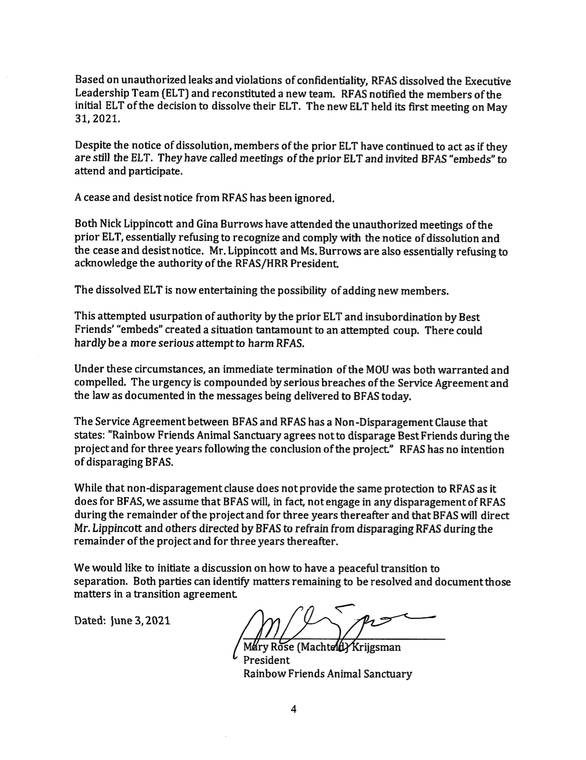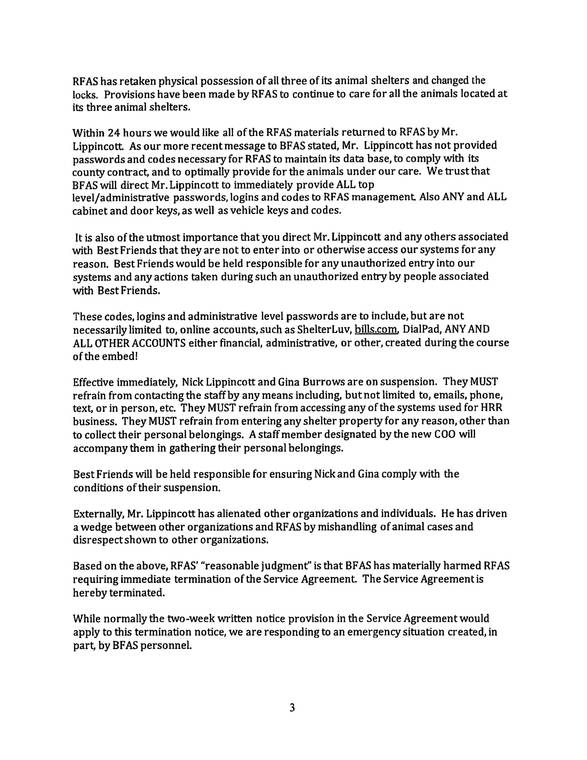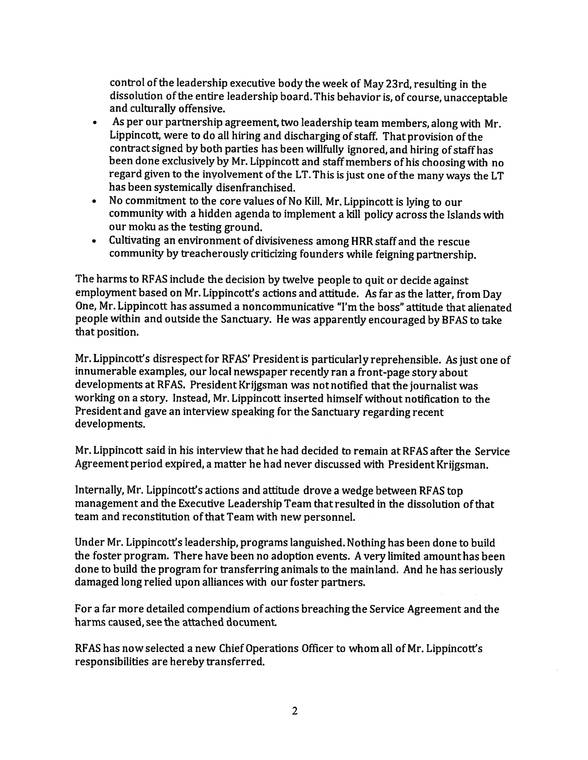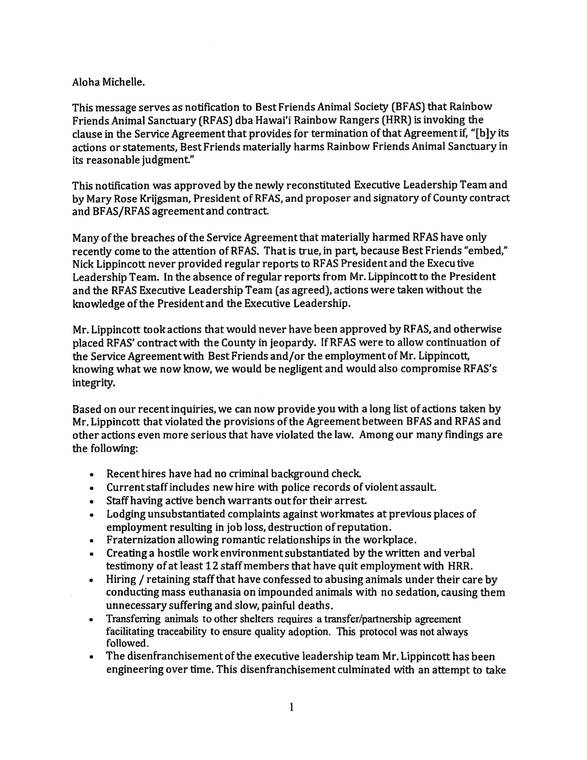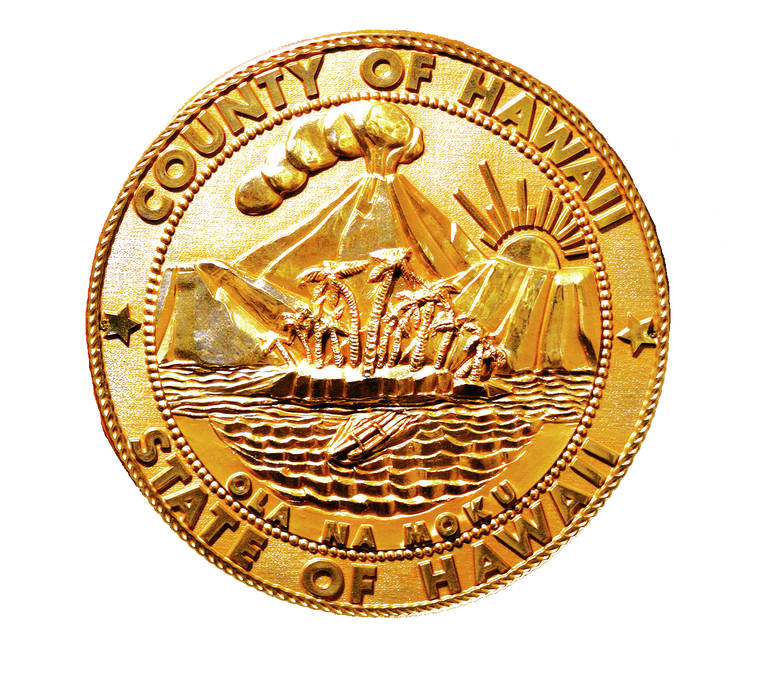Out of control: Sudden shift in leadership raises concern within Hawaii Rainbow Rangers





Weeks after transitioning into full services for Hawaii County’s animal control contract, abrupt changes have been made in leadership for the Hawaii Rainbow Rangers.
Out are director of operations Nick Lippincott, deputy director of operations Gina Burrows and the partnership with Best Friends Animal Society: a nonprofit no-kill animal sanctuary based in Utah. In are new chief operations officer Lev Yarborough and a new executive leadership team (ELT) formed after the dissolution of the previous ELT.
“I dissolved it because of breaches of confidentiality,” said president of Rainbow Friends Animal Sanctuary and signatory to the animal control contract Mary Rose Krijgsman. “As far as change in management… It was necessary to take my organization back into my fold and be homegrown, as I always have been for 21-plus years.”
The sudden switch came as a surprise to both the Hawaii Police Department and Hawaii County Council. Kona Councilwoman Rebecca Villegas and HPD is Major Aimee Wana, who oversees the animal control contract for HPD, each stated they had been given no insight from HRR about the changes.
In a four-page document – dated June 3 and signed by Krijgsman – a litany of violations including staffing and labor law issues, personal issues and lack of commitment to HRR’s no-kill policy are cited as justification for terminating the agreement.
NO-KILL ANIMAL CONTROL
Former Kona shelter manager Michael Orr, as well as several other individuals familiar with HRR’s leadership who requested to remain anonymous for fear of retaliation, have asserted that the strict adherence to a no-kill policy was the primary rift eventually causing split with Lippincott, Burrows and BFAS. The letter also alleges Lippincott’s interactions with the initial ELT, “created a situation tantamount to an attempted coup.”
Another rift, which appears to have been the tipping point, involved a power struggle of sorts with Krijgsman, the ELT and Lippincott at odds. In the document, Krijgsman alleges Lippincott attempted, “to take control of the leadership executive body the week of May 23rd, resulting in the dissolution of the entire leadership board.”
The rigid no-kill stance has ultimately led to current overpopulation in HRR’s shelters. Multiple sources confirmed that the shelters are at or over capacity, with animals regularly held beyond the timeframe allowed by the contract using county funds, many for months at a time.
“Mary Rose is someone who is diametrically opposed to any type of euthanasia that is behaviorally based, length of stay or space,” Orr said, whose comments were made prior to being fired by HRR on Friday.
“I saw cats missing half their face,” said one worker. “Mary Rose and others refused to euthanize.”
Krijgsman explicitly disputed the claim HRR would not euthanize as a medical necessity.
“When there’s no quality of life further to be obtained from a veterinary standpoint, common sense standpoint, when the animal cannot move or do anything, problems eating, then yes: it’s totally time for the animal to go over the rainbow bridge,” she said. “We all agreed that no euthanasia should happen to make space, that animals with behavioral trouble should have a chance.”
HRR released a statement June 16 acknowledging shelters were completely full and requested the public’s help to adopt or foster animals. Those interested in adopting or fostering can reach HRR at (808) 913-5397 or email adopt@hipets.com.
This request has become necessary due in part to a significant reduction in HRR’s transfer resources. Kohala Animal Relocation and Education Service publicly announced a split from HRR in March, and severed transfer agreements with other organizations have followed. Krijgsman expressed hope the agreements with KARES and HIHS could be reworked in the near future.
Numerous allegations were made by current and former HRR workers including misused funds, illegal independent contractor agreements, unhealthy shelter conditions and unpaid bills, among other concerns.
MISUSED COUNTY FUNDS
The largest concern of misused funds was diverting county money for building out the east side’s new Keaau location at 16-266 E. Kipimana St.
“It’s a combination of county funds to get the facility up to par, Rainbow Friends funds, funds from concerned citizens, a grant and GoFundMe campaigns,” confirmed Krijgsman.
“The only facility that’s part of the contract is the Kona location because the county owns it,” said one source. “Any other established facilities have to be acquired at the cost of the organization, not animal control. The animal control funds are supposed to pay for necessary staff and necessary equipment in order to provide animal control for the community.”
SHORT STAFFED
Also gone are 10 of the 15 badged animal protection officers since the May 7 badging ceremony required lift the organization from interim services into full services, Krijgsman said. Orr’s firing on Friday marked the latest APO departure from HRR.
“We are hiring a lot of new people,” said Krijgsman. “I hope that by the middle of next week, we’re up to par again with 15 officers.”
All HRR workers are considered independent contractors: a practice every worker spoken to for this story considered an illegal employment situation. This practice has been in place since HRR began working under the county contract and continues to this day.
“We have all been independent contractors this entire time,” Orr said. “We don’t have any employment benefits. No health insurance, no paid time off, no sick leave, no workers’ comp. And the animals just keep piling up.”
Krijgsman confirmed all workers are independent contractors, though she did express plans within the next pay period to officially make every worker an employee.
Issues extend to a lack of shelter staff and veterinarians. Workers maintain HRR does not have any veterinarians on staff; Krijgsman claimed there is one part-time veterinarian who does rounds at the shelters. As a result, most medical procedures have been outsourced to private vets on the island, and unpaid medical bills piled up into the tens of thousands of dollars.
“We were told all the vets had been paid off and there were no more bills due,” said a worker. “We know that isn’t true because vets continue to reach out to us for payment.”
Though Krijgsman didn’t confirm an exact total of overdue bills, she did insist any outstanding balances would be promptly paid.
“Anything that was outstanding, that is being handled by tomorrow,” Krijgsman said on Friday.
Shelter overpopulation combined with reduced staff has led to unhealthy living conditions for animals. Multiple reports were given of animals housed without water, a roof or clean areas free of their own feces.
MOVING FORWARD
Authority with the contract lies with HPD. It is unclear what steps the Hawaii County Council can take regarding the contract, but Villegas indicated it will likely start with requesting a new discussion with HRR; the last time they addressed the county council was Oct. 6 of last year.
“If we need to be euthanizing animals because there are too many, then it’s unfortunate,” Villegas added. “In the photos I’ve seen and the conditions that they are in, it borders on if it’s really gracious and ethical to keep them alive.”
Wana said HPD is aware of allegations and is looking into various complaints received. Though the possibility of reverting back to interim services remains an option if conditions of the full contract are not being met, HPD does not have any imminent plans to put the contract back up for bid.
“[The contract] has been extended until the end of next June,” Wana said. “If the county or the police department decided to terminate the contract, then yes, a new bid could potentially come up. But right at this immediate moment, that’s not happening.”
Wana went on to explain that the contract would only be terminated if HPD determines there have been egregious breaches of the contract.
“You find a situation, you need to allow them some time to be able to rectify that situation. If it’s so egregious, the chief may elect to terminate the contract, but we’re not quite at that point yet.”
When asked, every HRR worker spoken to said the county should pull the animal control contract from HRR.
“There is literally no way for things to continue as they are,” Orr said. “They’re either going to have to get significantly worse and someone will get involved from the county or the police department, and they’ll finally pull the contract, or it’ll continue to get much worse and nothing will happen.”
“I would,” said one worker. “At this point, there’s been gross negligence.”
“I do think the contract should be pulled from HRR,” added another. “They’re not succeeding in what they’re promising the community.”
HRR was awarded Hawaii Island’s animal control contract on July 24, 2020, and transitioned from interim to full services in May. The organization received $94,000 per month for interim services and just under $164,000 monthly for full services. HRR can be reached at 808-666-9589 regarding complaints and requests for service.

